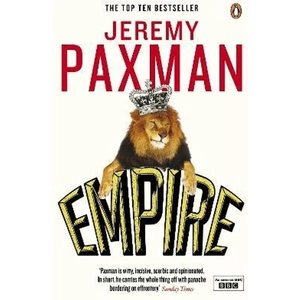The Book Depository Empire by Jeremy Paxman
442 ratings

TO EXPLORE MORE
Price: £10.99
Brand: The Book Depository
Description: Empire : Paperback : Penguin Books Ltd : 9780670919598 : 0670919594 : 01 Sep 2012 : The influence of the British Empire is everywhere, from the very existence of the United Kingdom to the ethnic composition of our cities. This title describes the selection process for colonial officers, the importance of sport, the sweating domestic life of the colonial officer's wife and the crazed end for General Gordon of Khartoum. The Book Depository Empire by Jeremy Paxman - shop the best deal online on thebookbug.co.uk
Category: Books
Merchant: The Book Depository
Product ID: 9780670919598
MPN: 0670919594
GTIN: 9780670919598

Author: Boydie
Rating: 5
Review: I think it’s just a small snapshot of the empire but a good, concise and, I think, pretty balanced view. Sad, funny and shocking in measures. I think something to talk about a little more perhaps.
Author: Tom Williams
Rating: 2
Review: 'Empire' was written to stand alongside a television series, but it's not the script and it is very sparingly illustrated, so it has to rely on argument rather than its visual appeal. Perhaps this is the core of what is wrong with the enterprise. Television can throw all sorts of images at you, leaving you to make your own connections. Things aren't referenced, chronologies get muddled and, with the whole exercise spread over several weeks, you can get away with shifts in your arguments and internal contradictions which you would not expect to see in a book. As television, Empire may have worked (although many critics seem to think that it didn't). As a book, though, it is a complete mess. Although it masquerades as history, the book is really an exercise in rhetoric. Paxman's trademark sneer translates well to the page. It is ironic that much of the book derides, at length, the elitist pretensions of the English, using a style and tone that immediately marks Paxman as the Oxbridge graduate that he is. For somebody who repeatedly criticises the British for their Anglo centric view of the world, Paxman's own vision seems peculiarly distorted by the country he is writing in. For him, the British Empire is different from all other empires, apparently unique in its arrogance and exploitation. It is almost as if other empires did not exist. So he writes that the Treaty of Paris in 1763 made it "undeniable that Britain was the pre-eminent world power". The treaty did, indeed, mark the end of a war in which Britain had been victorious over France and Spain, but it returned many of the territories that Britain had captured from the Spanish and left Spain in control of the Americas from Louisiana and California down to Chile. Meanwhile Britain's American colonies were restricted to those parts of Canada that had been settled and the original thirteen American colonies together with the areas opened to the west as far as the Mississippi. Most of these territories, of course, were to be lost with American independence. Britain had significant possessions in India, but Clive's victory at Plassey had taken place only six years earlier and nobody in 1763 could have foreseen the growth of British power in India. Otherwise, British colonisation was limited to a few specks on the map in West Africa, the West Indies and, nearer home, Gibraltar and Minorca. Paxman's confident assertion that British pre-eminence was "undeniable" is unlikely to be echoed by a Spaniard. Paxman's approach does mean that his book is not bogged down in the kind of tedious detail that I have just gone into in trying to define the size of the Empire in 1763. Such a definition is quite difficult. Do we include uninhabited and unexplored regions of the world as part of the Empire simply because they were painted red on the map? What of those distant shores where a visiting British captain had once planted a Union flag and then moved on? That's the problem with history: it's messy and complicated. Paxman's book gets rid of the mess and complications but, unfortunately, this means that he gets rid of much of the history as well. The absence of any solid foundation to this edifice is partially disguised by the use of lots of quotations with footnoted references. In many cases, though, the references are to secondary sources. That is, if you check the reference, it will turn out to be a recent publication by another author with no indication of where the original quote came from. This is particularly annoying if you are trying to check any chronological details as this approach means that the date of the original quote is not given anywhere in Paxman's book. He also has an annoying habit of referring to "colonial historians", which most readers, I think, would take to mean historians from Britain's colonial period, whereas Paxman uses the term to disguise the fact that he is citing a modern historian who writes about colonial history. It's possible that his use of this terminology is just sloppy and lazy, but I think it is difficult to see it as anything other than deliberately misleading. Generally, the book left me with a the feeling that some of the detail in it might be plain wrong, but as I'm not a professional historian this remained, for a while, just a niggling doubt. That changed when the book moved onto the Indian Mutiny and, in particular, the siege of Cawnpore. I have written a novel set during the siege, so it is a historical event I know something about. It's easy enough to research. The Indian Mutiny generally, and the siege of Cawnpore in particular, was the subject of spectacularly detailed analysis in the years immediately following and several modern historians have produced excellent summaries. (The best is probably Ward's 'Our Bones are Scattered'.) Paxman makes several errors. He says that the rebel leader, Nana Sahib, was "a victim of the Company's new Doctrine of Lapse which decreed that only natural born sons could succeed to the father's lands". Nana Sahib did, indeed, suffer under the Doctrine of Lapse, as the British refused to recognise his title. He did not, however, have any lands to lose. His adoptive father had already forfeited these as the result of a failed rebellion many years earlier. Nana Sahib did lose his father's pension, but this was not because of the Doctrine of Lapse. Paxman claims that the shooting of prisoners was "too inefficient to act as a final solution" where most accounts agree that the rebel soldiers deliberately fired wide - an act for which they surely deserve some credit, even after 150 years. Most astonishing of all, Paxman claims that the women and children murdered in what is generally became known as the massacre of the bibighar, had not been included in the promise of safe passage given by the Nana Sahib. This is quite astounding, as even the most cursory reading of any of the literature about Cawnpore shows it to be simply untrue. The point, though not significant in the context of Paxman's arguments, is not a trivial one. The cold-blooded massacre of women and children who had surrendered under promise of safe conduct was a significant factor in the horrific level of reprisals conducted by British forces. Whilst it does not excuse British conduct (which did lead to expressions of concern even at the time) simply rewriting history in this way is quite extraordinary. We can't blame Paxman for all the mistakes. His acknowledgements start with a credit to Jillian Taylor, who seems to have done much of the work. Paxman refers to himself as the writer. And here is the nub of the problem. Historians research their subject areas and, from the mass of information which they gather, they try to tease out some proper understanding of the subject. Paxman clearly started with his own prejudices (he read English at Cambridge and has no background in history) and then sent Ms Taylor off to gather up whatever factoids she could dredge up to support his position. In fairness, many of the factoids are fascinating. We learn, for example, that Lord Crewe, the Colonial Secretary, was so dull that it is alleged that a woman lost her mind listening to one of his speeches. We don't know who the woman was and no authority for the story is given, suggesting it is apocryphal, but it's amusing nonetheless. It isn't exactly history, but then neither is the extended summary of the plot of Rider Haggard's She with which he opens a chapter on the role of women in the Empire. Unattributed quote, after-dinner tales and outright fiction - it's all grist to Paxman's mill. It would be easier to forgive the way in which Paxman has subjugated historical fact to the presentation of his rhetoric if all of this was done to illustrate some worthwhile argument. But, though the whole idea of Empire is clearly anathema to Paxman's 21st-century liberalism, it's not at all clear where he is going with this. He argues that modern Britain is itself a product of Empire, an argument that would surely be better supported by an analysis of modern Britain than by a trip through 300 years of colonial adventurism. He claims that the Empire was always about making money, but later discusses at length the good that was done by many young men who served abroad, dedicating themselves to the welfare of people that Britain had taken responsibility for and from whom it could never sensibly expect to make a profit. He details the brutality of some British military ventures but, finally, concedes that other nations have often behaved even worse and that, given the geo-political realities, many countries were better off under the protection of Britain than had they been left to other occupiers. Perhaps, in the end, Paxman has accidentally stumbled on the truth of the British Empire. It was, indeed, in many ways a very bad thing, but sometimes it achieved things that changed the world for the better. (Paxman singles out the abolition of slavery as one of Britain's greatest achievements.) It was run by some wise men and a great number of fools. Many were in it just for what they could get out of it, while many a young man died far from home convinced that the good that he could achieve more than made up for his meagre salary. The British Empire was vast, inchoate and very, very complicated. The unthinking condemnation of Empire by modern liberals is as prejudiced and ignorant as the unthinking jingoism of an earlier generation. If other readers take this lesson from this extraordinarily poorly constructed book, then, perhaps, there is some tiny glimmer of worth hidden amongst all the dross.













